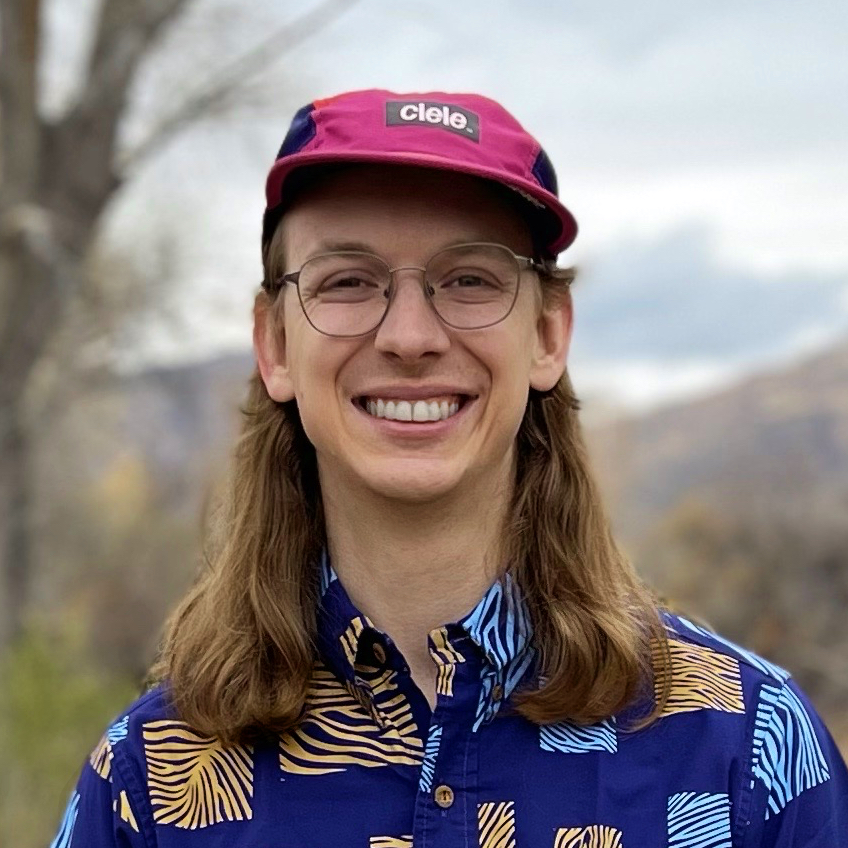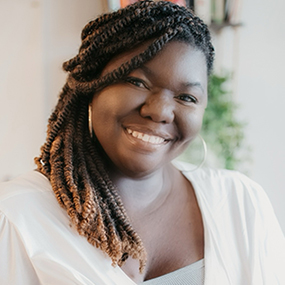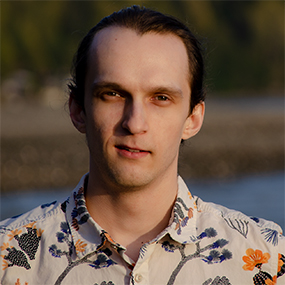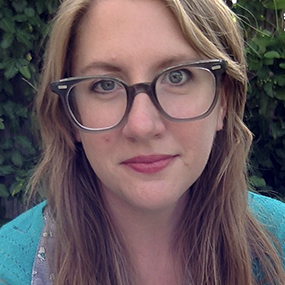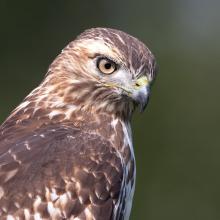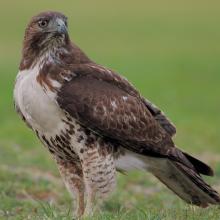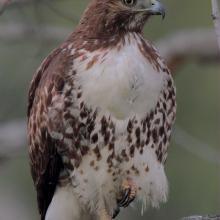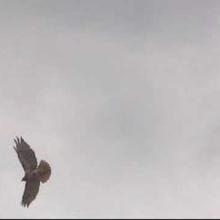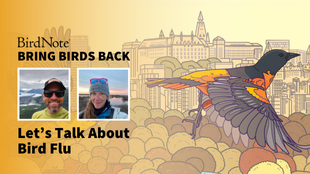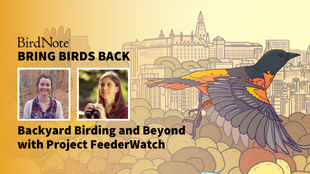

Join BirdNote tomorrow, November 30th!
Illustrator David Sibley and actor H. Jon Benjamin will face off in the bird illustration battle of the century during BirdNote's Year-end Celebration and Auction!

Maya Higa is a 24-year-old streamer, falconer and sole founder of Alveus Sanctuary, a wildlife reserve outside of Austin, TX. What's unusual about Alveus is its digital footprint — it's "a virtual conservation education center facility" primarily found on Twitch where Maya streams to teach viewers about the animals and conservation challenges they face. This novel approach to conservation and science communication is not only reaching and engaging newer and wider audiences, but helping to change the landscape of conservation.
Tenijah Hamilton: From BirdNote, this is Bring Birds Back. I'm Tenijah Hamilton.
[Curious, plucky music begins]
I’ll be honest: I am not a big Twitch person. I think of the website, Twitch dot TV, where you can livestream video to your audience, as being for hardcore gamers… and that’s just not me. But I recently learned about someone using the service in a bit of an unusual way: Maya Higa, founder of the Alveus Sanctuary. It’s a nonprofit animal sanctuary — straightforward enough — and it’s a virtual conservation education center.
Maya is, like, taking this whole remote work thing that some of us are doing to a whole new level. Her job is livestreaming on Twitch while she takes care of the rescue animals, doing educational presentations for her audience about all kinds of conservation issues… all while she’s running a nonprofit.
It’s wildly cool, and just a totally different approach to conservation than I would have ever thought of, reaching a really unique audience. And her streaming career started because of her love for birds — so naturally, I had to have her on Bring Birds Back.
This episode, Maya’s taking us through her first conservation livestream experience rehabbing a Red-tailed Hawk, starting her own nonprofit, building an animal sanctuary, and creating a virtual community that supports birds and other animals in real life.
[Curious, plucky music solo; then fades out]
Tenijah Hamilton: So Maya, I want to start with where my mind went when I first heard about Alveus, which is like: conservation plus the Twitch world? I know for me, I just automatically think like gaming or like 24-hour Bob Ross streams. You know, that’s another thing I know Twitch for.
Maya Higa: There you go. Love it.
Tenijah Hamilton: Is it still that way for you? Where it's like, oh, I'm doing something like, that a lot of people don't do before I'm breaking new ground.
Maya Higa: Yeah, it's definitely different. Twitch is still a lot of video games, but there's also cooking and art and singing and lots of other stuff on that platform nowadays. But I'm a part of a very small community that does anything related to wildlife, and especially conservation education. So it's an interesting intersection. But it's been a really cool one.
Tenijah Hamilton: Yeah. So I know that all this kind of begins with your time at zoos, and that's kind of how you became obsessed with birds. Is that true? Can you tell me a little bit about that?
Maya Higa: Yeah. So I did grow up on a farm, a small farm. And then when I went to school, I went to school for agriculture. I was gonna do sustainability in the livestock industry. And then I got an internship and started volunteering at a couple zoos in Central Coast, California. And the first zoo that I got an internship at had this big bird of prey yard. And I had never really had an interest in birds prior to that. But, through taking care of them and training them and doing education programs with them, I really fell in love with birds at that zoo. I got my falconry license through that zoo and rehabilitated my first bird at the end of my internship at that zoo. So fell in love with birds that way, for sure. And particularly birds of prey are, like, my thing.
Tenijah Hamilton: So when you were there and you were kind of doing that work, it was centered around conservation outreach, right? Just what does that mean? Like paint a picture for me.
Maya Higa: Yeah. So most zoos have an education program of some kind. And most of those programs revolve around educational ambassadors. So they have species in captivity that are non-releasable that are meant to be ambassadors for their wild counterparts. So we'll take those animals out to schools and special events and birthday parties, whatever. Wherever people wanna meet animals and learn about them, and do educational programs for those groups of people.
So when I was working at the zoo, I was a conservation education and outreach intern. So we would load up animals in a van and take them out to programs like that. And then teach people about them. Went to the mid-state fair, taught people about them.
Tenijah Hamilton: I mean, to me that kind of seems like the best job ever. Was it as fun as it seems? Like you get to, it feels like, spread your enjoyment and your natural kind of predilection towards animals to other people and get to watch them learn and enjoy it.
Maya Higa: Yeah. The absolute coolest, for sure. It was something that I fell in love with really fast. Cause I had never worked with exotics before working at those zoos. But once I started that outreach and I saw people get excited about these animals. And it's so important for people to see the animals, to have a connection to them. And yeah, seeing all that, especially in kids, was really special for me. It's like the coolest job ever.
I do miss going out to places cause my current job is— it's all done virtually, so I never see people anymore and I don't take my animals anywhere. So it's different, but both good.
Tenijah Hamilton: Mmm. You hadn't had, necessarily, a big interest in birds beforehand. You got to the zoo. Especially the birds of prey, really caught your eye. What stood out about them particularly that was like, oh yeah, like I wanna get my falconry license and I wanna do more work with them.
Maya Higa: Yeah, that's a good question. It wasn't just that I didn't— I wasn't super into birds growing up. It was like I had no interest in them. You know, I was just mammals, mammals, mammals. Like I was like, I don't care about birds at all. I remember there being a really distinct feeling the first time I caught a bird on my glove. We were flying this Red-tailed Hawk. And when the bird flies up to your glove, it just never gets old. You know, it's just such a cool feeling. And they're so stoic, you know, in the way that they present themselves and the way that they are. And I think there's also something really humbling about working with birds of prey because dogs and cats, sometimes, you know, are super affectionate and really like people and wanna be around you. And these birds of prey really don't care about you. But to love something so much and so deeply, you know, and for them to just be like, eh, it was also really interesting and not an experience I'd had with animals, because I'd grown up with domestics all my life. So I think that also drew me in, in a weird way.
Tenijah Hamilton: You mentioned Red-tailed Hawks and I know that rehabilitating a red-tail was pretty central to your bird-journey, yeah?
Maya Higa: Yeah, my first deep experience with the bird of prey was this Red-tailed Hawk named Bean who was brought into the zoo I worked at. He was super emaciated. It was just a found laying by a fence kind of thing. I don't know if it said he got some sort of minor injury or he just couldn't figure out how to hunt for himself at that age.
But I got my license to rehabilitate him. So I tube fed him for the first few nights and started flying him. Got him to fly, you know, 10 feet, 20 feet, 50 feet. Got him to hunt on his own again, and then did this big release thing. And it was pretty crazy. Pretty wild experience, um, but really, really, special.
Tenijah Hamilton: That's really cool. What was it like taking care of Bean? And are there any, like, special moments that stuck out with you?
Maya Higa: It's a really interesting balance with rehab of, not just birds, all wildlife. In that he got a lot better. He got a lot less stressed when I was working with him and flying him and he trusted me a little more. You know, he wanted to come to my glove. He was into training sessions and stuff like that towards the end. But it's also a fine balance that you have to do with birds that you're gonna be releasing, or wildlife you're gonna be releasing. Cause you don't want them to really like you, you know, cause they are wild animals. And so at the end of the day, if by the time you release 'em they leave and they want nothing to do with you. Then you've done a really good job. Uh, he was a wild bird by the time I released him. So that was really rewarding. But also confusing, right? Cause you love him so much. It's like, aw, He doesn't care.
Tenijah Hamilton: A lot of emotions.
Maya Higa: Yeah.
Tenijah Hamilton: And then Bean was also a pretty big part of your story as a streamer, right?
Maya Higa: Yeah. I started originally doing singing streams, just little— my guitar on my bed kind of thing— but I was a falconer at the time. And so I told people that I had a bird. And they were like, you don't have a hawk in your backyard. And I was like, I do. So I brought him out.
Maya Higa: Should I get him? Do you guys wanna meet him? The hawk? This is Bean, he is a juvenile Red-tailed Hawk. He just sh*t on the floor, um…
Roommate: Oh my gosh!
Maya Higa: Sorry. I’ll get it.
And that day when I had the hawk on my stream, they clipped it and put it on Reddit and that went viral. And, uh, that's how my channel started growing- was through that bird, Bean.
Tenijah Hamilton: What an unexpected delight.
Maya Higa: Oh, I know. A hundred percent. I never expected streaming to be my career. So I really got thrown into it that way.
Tenijah Hamilton: So how did you even kind of connect the dots between the conservation outreach work that you were doing for a long time, like in person, IRL, to the viral stream of your bird.
Maya Higa: Yeah. So I did a lot of that rehabilitation process with Bean on my stream. So they saw him get stronger. They saw him in his whole training process and they saw the video of his release as well. So thousands of people were getting attached to this bird and became invested in his process. And it was a similar feeling to when I was going to classrooms and teaching kids and they were all really excited and they really liked this particular animal that they met. And so I realized that Twitch was a way for me to teach people and do conservation outreach without having to load animals up in a van and take them places. ‘Cause that's a pain and it can be really stressful for the animals sometimes. And it could be a lot more people, you know, from a classroom of 20, to an audience of now average around 7-8,000 at a time.
And Twitch's demographic is mostly men and it's mostly like 18 to 25 years old, which is a really hard demographic to reach with conservation. So it's kind of an untapped demographic. I realized I could do all of those things and do it virtually.
And so I started a podcast, the Conservation Cast. And I talked to conservationists and biologists and ecologists on my stream. And I just gave 'em a platform to talk about their research. But it wasn't great viewership wise. It was just too dense. People just didn't really wanna listen to it cause they're young men and their attention spans are very short. So it wasn't really working. And I was like, I need live animals. Like I need animal ambassadors to teach. That's what helped me the most at zoos. It's what's gonna help me now. And so that's where the idea for the nonprofit was born, is: have animals at a physical sanctuary and put 'em on camera and get people to fall in love with them that way. But do the same education programs that I was doing before.
Tenijah Hamilton: That makes it really clear kind of how the idea for your nonprofit was started, but what were like, the practical steps you had to take to make it a reality? Because it is, ostensibly, kind of a jump, right? Like it's a leap.
Maya Higa: Yeah.
Tenijah Hamilton: So how did you kind of bridge that path between the idea and starting Alveus?
[Playful, analytical music starts]
Maya Higa: So many steps. It's still so much trial and error. But I wrote out a three year business plan. And I talked to a bunch of conservationists about it. I talked to my parents about it. I talked to some business folks about it. Some other content creators about it. And then I decided to do a capital campaign fundraiser in February of 2021.
It was a 21 hour long stream. There were a bunch of activities. There was an auction within the stream and it was just this— it was called a fund-a-thon. So the more money I raised, the longer I stayed online. And I had a goal of shaving my head at $500,000, which I did not think we would reach, cause I wouldn't put that goal if I thought we were gonna hit that much money, cause I had to shave my head. Um, but we raised $572,000 in 21 hours. So that's what got it going. And when we hit that goal, I shaved my head live on stream.
Twitch Streamer: It’s time.
[Electric razor turns on]
Maya Higa: Ok.
Twitch Streamer: This’ll look really good Maya. This’ll look so good when it’s done, trust me.
[Scissors cutting hair]
They won't see it, but this is how much my hair has grown in the past year and a half.
Tenijah Hamilton: Yeah, you got a head a hair now.
Maya Higa: Yeah, it grew fast. But that's where it started. Um, and then I bought 15 acres out in Central Texas. I started asking around, at zoos that I already knew, asking if they had animals that they were either willing to part with or needed to part with or overstock. I asked rehab centers if they had animals that needed to be rehomed, that were non releasable. And I started collecting some ambassadors. I had made a trip to California, came back with four parrots, a chicken, a chinchilla, two snakes and a bullfrog and an emu. A baby emu. Built all the enclosures out on my 15 acres. And we've just kind of kept adding ambassadors here and there.
I hired a couple full-time employees. I have a part-time employee that are keepers, animal trainers, help me with tech, help me with permitting, stuff like that. And there's just like a lot of things that have gone into it, but, um, it's kind of felt like planet zoo, but way more complex, you know. We're just like putting enclosures everywhere and filling 'em up with animals and doing our best.
Tenijah Hamilton: So, yes. I understand when I said that question, I was like, there's a big gap between doing it. But wow. Like you were not kidding, so much had to happen for you to get to where you are now. Like what hard— like incredible, but like worthy work. And I'm sure it's a sense of fulfillment, cause you seem like you are living your best life and like living your purpose. Even though I'm sure it's hard. I'm sure you have hard days. But still.
Maya Higa: Yeah, absolutely. It's the dream. It's very cool.
Tenijah Hamilton: You know what kind of strikes me as I'm listening to you talk is: you know, the world of science, can feel very gatekeepy, right? And I'm listening to how much of what you've done has been self started, has been kind of funded and resourced by community. And it seems like a really inclusive experience of people who potentially would've never gotten this experience before. Like how does that make you feel?
Maya Higa: Yeah. It's very cool. I think it's a double-edged sword. ‘Cause sometimes it makes me feel a little underqualified, but then the other side of that is that I'm 24, right? And I also do cooking streams and I do art streams and I sit at my computer like this and I talk to them about whatever we talk about. You know, we watch YouTube videos and stuff like that. So I'm much more relatable than your typical biologist. But I think that it makes me a better educator ‘cause it feels like the difference between reading a research paper or something that you have no connection with that's really hard to read, and just hearing somebody talk about something that they're passionate about, that you feel like you know, almost. So, it's a neat opportunity.
Tenijah Hamilton: We're going to take a quick break, and when we come back we'll talk about the animal ambassadors of Alveus, what it’s like to stream your workday for thousands of people on Twitch, and… a beloved cockroach? Stick around.
[Playful, analytical music fades]
Tenijah Hamilton: And we're back. So Maya, I know you've kind of described Alveus as a wildlife sanctuary and a virtual conservation education center. I want to dig in a little more here — what sort of things are you up to at Alveus?
Maya Higa: A couple pillars of Alveus. One: rescuing animal ambassadors. So all of the animals we have are non-releasable. They're rescued either from the illegal pet trade, overstock from zoos, wildlife that's deemed non-releasable for a variety of reasons. So sanctuary is one of the pillars.
Another one is conservation education on my own channels. So I curate education programs. I teach people about them. I stream myself zookeeping and taking care of all the animals. So they get, really, the behind the scenes of all of their lives.
And then another pillar is collaboration. So one of my goals that I've been starting to do more recently with the nonprofit is inviting other content creators out to the facility and streaming on their channels or making videos for their YouTube to combine as many audiences as possible, and audiences that they have that I don't have overlap with so I can teach them about my animals as well. You know, it's really fun for them. It's kind of the same concept as— I don't know if it's the late show or the tonight show, they bring animals on and they, like, meet celebrities, you know, if you've seen those. It's just cool to see people that you're fans of interact with animals.
Tenijah Hamilton: So we're kind of naturally leaning into the animal ambassadors. And I would love to know more about them. Can you tell us who they are? What work is like caring for them and just any favorites or fan favorites?
Maya Higa: Yes. I've been surprised at how invested people get in the ambassadors themselves. Like people get really attached to them. They make fan art of them. They draw them. We have a PO box and an Amazon wishlist and they send them treats and toys and they just love them.
Stompy is our emu. He was our first ambassador. They have watched him grow up from watermelon size to, I mean, he's my height now. You know, he's like five feet tall at his, at his head. So they love Stompy.
[Stompy making cute little chirps]
Maya Higa: Oh my god, he actually loves it.
Tenijah Hamilton: One toy that was sent to stompy the emu was a slip-n-slide. And if those cute little emu noises are any indication, he is a big fan.
[Stompy making cute little chirps]
Maya Higa: Oh my god, are you happy in there? Is it nice? I can never turn this off.
Maya Higa: All of my ambassadors have a purpose for education. So Stompy I've used to teach people about the exotic meat trade, primarily.
And then Georgie is a huge favorite, African bullfrog. He's like, almost four pounds. He's huge. And he's an ambassador for chytrid fungus, which is this pathogen affecting amphibians worldwide. For pollution, how that affects frogs ‘cause of their skin; for the frog leg trade. Uh, stuff like that. So Georgie's there.
We have four parrots, they all have different rescue stories. But parrots are ambassadors for the pet trade. They are tough to take care of.
Tenijah Hamilton: Like, when doing a presentation about the illegal pet trade, those parrots would not stop squawking:
Maya Higa: …for the illegal pet trade-
[Parrot squawks]
Maya Higa: This is 100% about you, but-
[Parrot squawks]
Maya Higa: It’s a little much right now, okay? Thank you.
Maya Higa: One of the things that I teach people about is how hard parrots are to have as pets and that they live a really long time and they're really loud and they can be really destructive. And we have two macaws. We have an African gray and a blue-fronted amazon. And the little parrots talk.
Maya Higa: Walk-y talkies! Oh my god.
Parrot: Oh my god!
[Maya laughing]
So the stream loves to, you know, interact with them and hear them talk and laugh and sing and whatever they do.
[Parrots imitate laughing]
[Maya laughing]
They're probably the most work out of, out of the ambassadors we have. They need the most enrichment, and the most time.
We have a couple crows, we have two snakes. We have a lot of insects. Two donkeys and a cow. She's a new addition, baby cow. Chinchillas. I did a whole presentation on chinchillas today about the fur trade. And that might be it. And chickens.
Tenijah Hamilton: Chickens, of course.
Maya Higa: Yeah. Chickens to teach people about the ag industry and consumer choice and food labels and stuff like that. Because it's cool to give people things that they can actually do, you know, in their daily lives.
Tenijah Hamilton: I— what time do you wake up in the morning?
Maya Higa: Actually, I just wake up at eight. It's really not bad at all.
Tenijah Hamilton: Ok that's not terrible. I'm just like— how do you— like that seems like so much work, how do you have time to take care of all your ambassadors?
Maya Higa: I have an animal care coordinator who lives on site. So she's always there. And then I have an animal husbandry and training program manager. She's full time. And so she's taking care of all the animals every day. So I have a lot of help out there, which is really nice. It's definitely not just me out there shoveling poop and changing waters every day. They help me a lot.
Tenijah Hamilton: Ok, ok, that seems a lot more doable. Still hard! But doable. So what are the Alveus streams like? Um, I would love to have some examples of just some more things of like what you show people. So I'm hearing you talk about all the kinds of presentations kind of, you give people on like the different trades and things like that. What are those like? And I'm really curious about the impact that you hope to have on folks.
Maya Higa: Yeah, I do a series called Animal Quest and I spotlight different species that we have at Alveus. So today it was chinchillas. And I make a presentation and I talk about the fur trade and their natural history and the history of chinchillas and humans and their wild counterparts and what they eat. And just everything Chinchilla.
And I have the chinchillas with me during the presentation, so they get to see ‘em run around and stuff like that. There's a recommendation section on each Animal Quest of like, what can you do to help protect this animal? Even if you're living in the US, and it's an animal from Africa, you know? I've done Animal Quest episodes for lots of our animals now. The emus, the donkeys, the frog, the snakes, et cetera. Those are once a month.
Once a week I do a keeping stream, which is: start in the morning on Saturday. I go out, I check on all the animals. I change all their waters. I feed all of them. I do all my diet prep. I do my enrichment prep on stream. We do some training sessions sometimes on those streams, feed the frog on the stream, feed the snakes on the stream. Stuff like that. So they get to see all the parts of the care that goes into those animals.
I think it's really important that people feel like they have a connection to these ambassadors. Because then when they think of their wild counterparts— if they think of an emu, I would like to think most of my viewers, if they see an emu somewhere, they're gonna think of Stompy. Because there's just that connection there, you know? And there's that conservation quote that people protect what they love, they love what they understand and they understand what they're taught, right? So my role in conservation is the teaching part and putting 'em on that path and then getting them to the point— or hoping that they get to the point where they'll wanna protect those animals as well.
Tenijah Hamilton: So these streams, some of them, are just full work days, you know, ranging from animal care to cleaning to building out an enclosure. And is it hard being on camera so much? Um, it feels like it might get real tiring after a bit.
Maya Higa: Yeah. It's exhausting. Some of my colleagues— I'm friends with a lot of streamers and some of them just thrive, you know, they're, they're on stream eight hours a day. Every day. They don't take days off. I, I don't know. I think I'm an introvert. So when I'm on stream, afterwards, I'm just exhausted. Cause you're, you're not just, like, hanging out and working like you normally would on stream. You're talking to a chat the whole time and trying to entertain them. And so, yeah, it's exhausting. But I consider myself a part-time streamer cause I only stream three or four days a week. So it's not so bad.
Tenijah Hamilton: And that to me— I just kind of did like a- a double take, cause I'm like, that doesn't seem like part-time to me. But I too, like you, fall into, like the introvert corner. And so I'm like, that's so much time to like, be on camera and sharing your life with people.
Maya Higa: It's a lot. It is a lot. But I do get energy from conservation education. Like I get really stoked when I'm teaching people about animals. So that helps.
Tenijah Hamilton: I’d love to hear: What's something you're really proud of from this first year or so of running Alveus? Any kind of impact you've seen there, or a moment that surprised you?
[Hopeful, inspirational music starts]
Maya Higa: I'm really proud of the invertebrate program that we're building. We have a colony of Madagascar hissing cockroaches. And when I first introduced them, everyone was like kill it with fire. Ew. Like burn it, squish it. I hate it. And over time, they've grown to like them. They've named some of those roaches. And I had to euthanize one of the roaches a few weeks ago cause she was really slowing down and they were all so sad about it. You know, they were like: oh my gosh, no Barbara — like they named her Barbara.
Tenijah Hamilton: Oh, Barbara!
Maya Higa: And, um, it was just such a shift. And I'm so excited to see it with our other insects. ‘Cause I have isopods as well. And I have a vinegaroon.
Tenijah Hamilton: Words I've literally never heard before.
Maya Higa: Okay, so like rollie pollies. And a vinegaroon—
Tenijah Hamilton: Talk to me, talk to me in my language. I got you.
Maya Higa: A vinegaroon is a, it's an arachnid. So like a scorpion, spider. You know, people still have some adverse reactions to those bugs, but I'm really excited to kind of help shift that.
Tenijah Hamilton: That's real dope.
Maya Higa: And then also we're a nonprofit. And so far we've been completely funded by this online community, and it's a pretty big operation, and we have some pretty spectacular enclosures for these animals. Like their welfare is anything that I ever dreamed of in being a zookeeper, you know. And it's all funded by the community. So they've been super generous. They just, they love it.
Tenijah Hamilton: Awesome. Well, thank you so much for your time Maya. This has been really illuminating. I, um, I feel like every episode I'm like, I wanna come visit, but no, I actually wanna come visit. So if that's on the table…
Maya Higa: You should! Yeah, come around for sure. That'd be sick.
Tenijah Hamilton: That would be really great.
[Hopeful, inspirational music starts]
[Outro music starts]
Tenijah Hamilton: You can watch so, so much of Maya’s work at Alveus on Twitch. We’ve got links on our website, BirdNote.org. Go see an Animal Quest, or listen to cute Emu noises, or look at a big ol’ bullfrog. They’re super fun, and a look at a totally different — and successful — approach to conservation. And that gives me some hope.
[Outro music solo]
Bring Birds Back is produced by Mark Bramhill and me, Tenijah Hamilton. Our production assistant is Sam Johnson. Our fact checker is Conor Gearin. Our content director, and editor this season, is Allison Wilson. Music is by Cosmo Sheldrake, Blue Dot Sessions, and Sam Johnson.
[Music ends]
About guest Maya Higa:
Maya Higa is one of the top female streamers on Twitch and a rising star on YouTube. Her passions include wildlife conservation and education and she integrates these into her content regularly, creating some of the most unique content on Twitch. Maya is a licensed falconer and wildlife conservationist. Her livestreams feature falconry, wildlife rehab, conservation education, and charity fundraising. She created a conservation podcast in 2019 which has since aired more than 60 episodes on her channel and raised more than $80,000 for wildlife protection organizations around the globe. Recently Maya founded Alveus Sanctuary, a non-profit exotic animal sanctuary and virtual education center in central Texas and raised more than $500,000 during her first fundraising stream thanks to her amazing community and fellow streamers.

